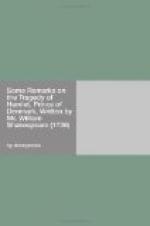Hamlet’s Conversation with Ophelia, we may observe, is in the Style of Madness; and it was proper that the Prince should conceal his Design from every one, which had he conversed with his Mistress in his natural Style could not have been.
I am perswaded, that our Author was pleas’d to have an Opportunity of raising a Laugh now and then, which he does in several Passages of Hamlet’s satirical Reflections on Women; but I have the same Objections to this Part of the Prince’s Madness, that I have before mentioned, viz. that it wants Dignity. Ophelia’s melancholy Reflections upon Hamlet’s having lost his Sovereignty of Reason, is natural and very beautiful. As to the King’s sending him to England, See Mr. Theobald’s Note. I purposely omit taking Notice of the famous Speech, To be, or not to be, &c. every English Reader knows its Beauties.
The Prince’s Directions to the Players are exceeding good, and are evidently brought in as Lessons for the Players, who were Shakespeare’s Companions, and he thought this a very proper Occasion to animadvert upon those Faults which were disagreeable to him. Whoever reads these Observations of his, if one may prove a Thing by a negative Argument, must believe Shakespeare to have been an excellent Actor himself; for we can hardly imagine him to have been guilty of the Mistakes he is pointing out to his Brethren.
Notwithstanding all this, and that the Opportunity seems natural enough to introduce these Remarks, yet I cannot think them agreeable in such a Piece as this; they are not suitable to the Dignity of the Whole, and would be better plac’d in a Comedy.
Page 292, Act 3d.
Hamlet’s Expression of his Friendship for Horatio, has great Beauties; it is with Simplicity and Strength, and the Diction has all the Graces of Poetry. It was well imagin’d, that he should let his Friend know the Secret of his Father’s Murder, because, thus his Request to him, to observe the King’s Behaviour at the Play, is very naturally introduc’d as a prudent Desire of the Prince’s. The Friendship of Eneas for Achates in the Eneid, is found Fault with much for the same Reasons that some Criticks might carp at this of Hamlet’s for Horatio, viz. that neither of them are found to perform any great Acts of Friendship to their respective Friends. But, I think, that the Friendship of Hamlet and Horatio is far superior to that of Eneas and Achates, as appears in the last Scene, where Horatio’s Behaviour is exceeding Tender, and his Affection for the Prince likely to prove very useful to his Memory.




